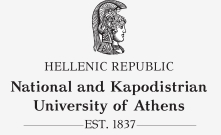CLASSIFICATION EXAMS
Classification exams for the acad. year 2025-26
Entrance Examinations for Degree Holders (Academic Year 2025–2026)
In accordance with the provisions of Law 4186/2013, as amended by Law 4218/2013, Ministerial Decision Φ1/192329/B3/13 (Government Gazette 3185/B/16-12-2013), and Law 4485/2017, which define the procedure for the admission of higher education graduates (entrance examinations for degree holders), the right to participate in these examinations is granted to graduates of Universities, Technological Educational Institutes (T.E.I.), or equivalent institutions, as well as graduates of A.S.PA.I.T.E., in Greece or abroad (recognized by the Hellenic National Academic Recognition and Information Center – D.O.A.T.A.P.). Holders of diplomas from higher schools of more than two years or of two years’ duration under the supervision of the Ministry of Education, Religious Affairs, or other Ministries are also eligible.
The percentage of admitted degree holders is set at 12% of the total number of students admitted each academic year to every University Department, T.E.I., or A.S.PA.I.T.E.
The selection of candidates for admission is carried out exclusively through entrance examinations consisting of essay-type questions in the following three subjects:
Medieval History of the West I (II12)
Prehistoric Archaeology I (IA02)
Ancient Greek Philology I (FA03)
By decision of the Departmental Assembly, only graduates of our Department (Department of History and Archaeology, National and Kapodistrian University of Athens) are placed in the 5th semester, while all other candidates are placed in the 3rd semester.
Applications and the required documents for participation in the entrance examinations must be submitted exclusively online through https://eprotocol.uoa.gr between 1 and 15 November 2025.
Required Documents
Application form of the interested candidate.
Copy of Degree or Certificate of Completion of Studies.
For graduates of foreign institutions, an equivalence certificate issued by the Hellenic National Academic Recognition and Information Center (D.O.A.T.A.P.) or another competent authority must also be submitted.Copy of the candidate’s national identification card (ID).
The entrance examinations will take place between 1 and 20 December of each academic year. The examination schedule will be announced by the Department’s Secretariat at least ten (10) days prior to the commencement of the first examination.
By decision of the Departmental Assembly of the University, T.E.I., or A.S.PA.I.T.E., as appropriate, admitted graduates may be exempted from certain courses of the Department’s study program, provided these courses were fully or sufficiently covered during their previous studies and correspond to courses of the host Department’s curriculum. In all cases, candidates are exempted from re-examination in the subjects in which they were successfully examined for their admission.
Oral Examination
Candidates with disabilities or specific learning difficulties may be examined orally or in writing, depending on their circumstances:
Oral examination, upon request, is granted to candidates who are unable to participate in written examinations because they:
a) are blind, according to Law 958/1979 (Government Gazette 191/A), or have at least 67% visual impairment, or are amblyopic with at least 67% visual disability;
b) have a permanent or temporary motor disability of at least 67% affecting the upper limbs;
c) suffer from spasticity of the upper limbs;
d) have fractures or other temporary injuries of the upper limbs that make writing impossible;
e) present specific learning difficulties, such as dyslexia, dysgraphia, dyscalculia, dysanagnosia, or dysorthographia.
The relevant application (in addition to the application for participation in the examinations) must be submitted to the Department’s Secretariat and be accompanied by an official medical certificate issued in accordance with the applicable system for disability certification, confirming that written examination is not possible.
Examination Syllabus
II12 – Medieval History of the West I
Overview of Medieval Western History (5th–15th centuries).
Examination material:
D. Nicholas, The Evolution of the Medieval World, MIET, 1999.
pp. 184–228, 267–312, 318–361, 385–413, 434–462, 491–520, 528–560, 631–665.
IA02 – Prehistoric Archaeology I
Introduction to Aegean Prehistory.
Examination material:
R. Treuil, P. Darcque, J.-Cl. Poursat, G. Touchais, The Civilizations of the Aegean during the Neolithic and Bronze Ages (Greek translation by O. Polychronopoulou, A. Filippa-Touchais), Athens 1996:
"Introduction", pp. 89–122;
Book I (“Neolithic Period and Early Bronze Age”), pp. 125–209;
Book II (“The Period of the Cretan Palaces”), only Chapters III and V, pp. 268–302 and 345–383;
Book III (“The Mycenaean World and its Surroundings”), only Chapters I, II, and III, pp. 403–555.
FA03 – Ancient Greek Philology I
Translation, interpretative, and linguistic commentary on the following texts:
A. Papathomas, Ancient Greek Texts of the Classical Period. A. Rhetorical Texts, Athens, 2017.
A. Papathomas, Ancient and Medieval Texts on Papyri, Ostraca, Tablets, and Early Parchments (430/420 B.C. – early 9th c. A.D.), Athens, 2019.
M. Thoma, Women Epistolographers in Ancient Greek Papyri, Athens, 2020.
E. Avdoulou, M. Thoma, N. Kanavou, E. Kaftitsa, A. Koroli, S. Costanza, V. Lentakis, M. Malamou, A. Maravela, A. Papathomas, A. Sarri, Th. Tsiampokalos, E. Tsitsianopoulou, Hellenistic Literature: Selected Prose and Poetry. Introduction, Text, Translation, Commentary, Athens, 2023.
For further information:
II12 – Medieval History of the West I: Professor N. Giantsi and Assistant Professor N. Chryssis.
IA02 – Prehistoric Archaeology I: Assistant Professor V. Petrakis and Professor I. Papadatos.
FA03 – Ancient Greek Philology I: Professor A. Papathomas and Associate Professor N. Kanavou.
